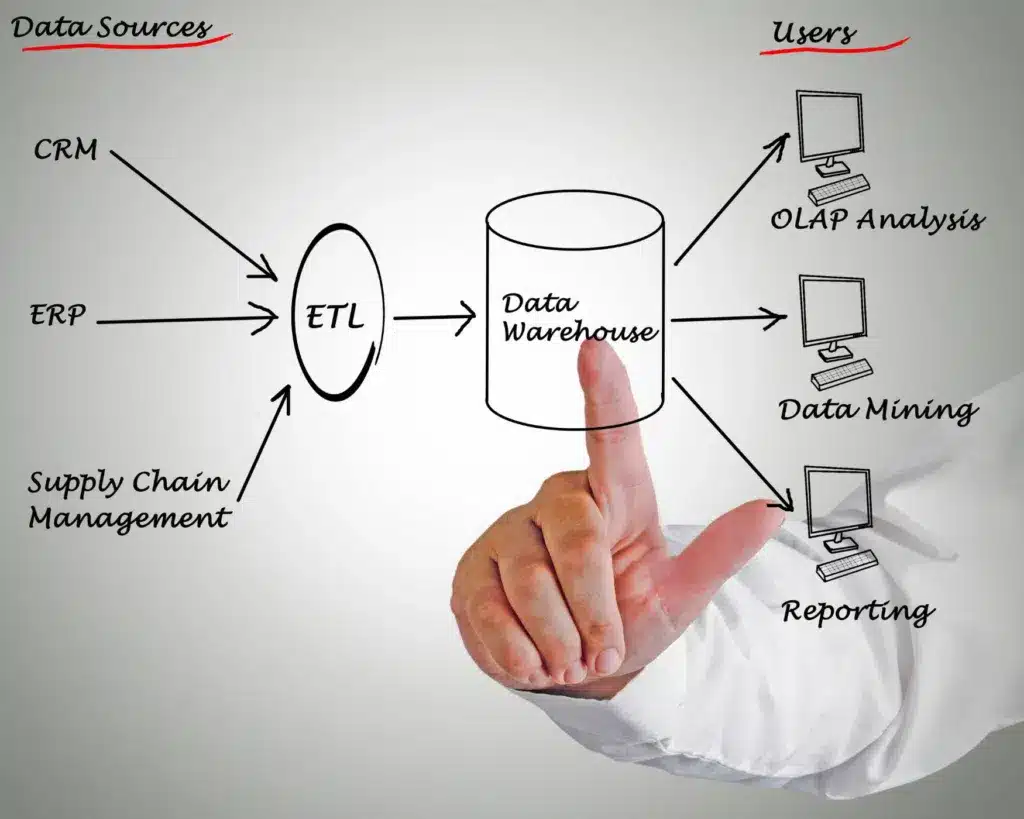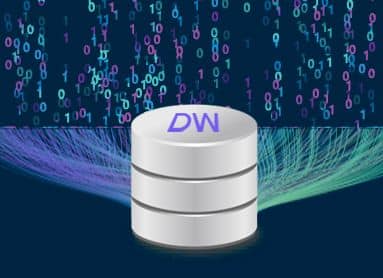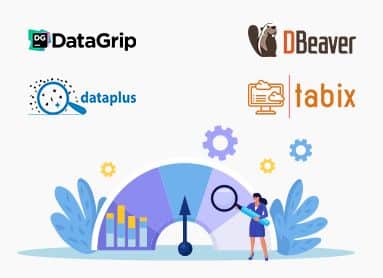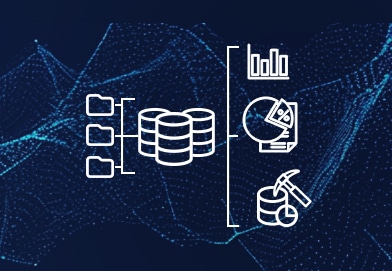Introduction
Efficient data management and analysis are now more critical than ever for businesses to thrive and maintain a competitive edge in our data-driven era. As the volume of data grows exponentially, organizations encounter the daunting task of extracting, organizing, and managing valuable insights from vast amounts of information. This is why data warehousing emerges as a powerful solution.
Data warehousing collects, organizes, and manages data from various sources into a centralized storage layer. It provides businesses with a unified and structured view of their data, enabling them to make informed decisions and gain valuable insights.
Last year, we wrote an article about the advantages of building a data warehouse in the cloud. In this post, we will delve into the top 12 benefits of data warehousing and how it empowers organizations to harness the full potential of their data. By understanding these advantages, businesses can leverage data warehousing to enhance operations, drive growth, and gain a competitive edge.
1) Enhanced Data Integration and Centralization

Data warehouses accommodate diverse data sources like databases, spreadsheets, and external systems through extraction, transformation, and loading (ETL) processes. These processes enable the standardization and harmonization of data from different platforms.
A unified and standardized data view is established by converting data formats, resolving inconsistencies, and ensuring compatibility.
Additionally, data warehouses utilize dimensional modeling techniques like star schemas or snowflake schemas to structure and organize data, simplifying data representation or efficient querying and analyses across different dimensions.
2) Improved Data Quality and Consistency

Data warehouses play a critical role in enhanced data quality and consistency through their support for data cleansing and standardization processes.
First, data warehouses facilitate data cleansing by identifying and rectifying errors, redundancies, and inconsistencies in the data. Data quality rules are applied through automated processes and algorithms to ensure data quality and consistency. Furthermore, data warehousing standardizes data formats and establishes consistent definitions across the entire data warehouse.
Second, data warehouses ensure data security, privacy, and compliance by implementing robust data governance frameworks and controls. They enforce data validation rules, referential data integrity constraints, and other mechanisms to prevent data corruption and ensure stored information’s accuracy, completeness, and reliability.
3) Faster and More Efficient Data Retrieval
Data warehouses offer several advantages for faster and more efficient data retrieval, driven by data indexing and optimized data storage.
First, data warehouses employ indexing techniques to organize and structure data for quick retrieval. Indexing involves creating indexes on key columns, enabling the database to locate and retrieve specific data more efficiently. Indexing accelerates query performance and enhances overall data retrieval speed by reducing the need for full table scans.
Second, data warehouses optimize data storage through techniques like columnar storage and compression. Columnar storage stores data in a column-wise format; it allows faster query execution by fetching only the necessary columns. Additionally, data compression techniques reduce storage requirements and enhance data transfer speeds.
4) Enhanced Business Intelligence and Reporting

Data warehousing is pivotal in supporting business intelligence initiatives by providing a reliable and consolidated data source.
First, data warehouses serve as a centralized repository that integrates data from heterogeneous sources. This consolidated view of data enables organizations to perform comprehensive analysis and gain valuable insights, forming the foundation of effective business intelligence.
Second, data warehouses facilitate the creation of meaningful reports by offering a unified and standardized data view. With consistent and accurate data, organizations can generate reports and visualizations that aid in understanding historical trends, identifying patterns, and making informed decisions.
5) Scalability and Flexibility
Data warehousing provides the necessary scalability and flexibility to accommodate the growing volume and variety of data.
First, data warehouses can handle large volumes of data from diverse sources as data grows exponentially. They can efficiently ingest and store structured, semi-structured, and unstructured data, ensuring comprehensive data management.
Second, modern data warehousing solutions provide scalability options for increasing data loads. They can scale vertically by adding more hardware resources to a single server or by distributing the data across multiple servers horizontally.
Third, data warehouse solutions offer flexibility in adapting to changing business needs and challenges, allowing for integrating new data sources, data schema modifications, and additional analytical capabilities.
6) Cost Savings and Return on Investment (ROI)
Data warehouse solutions offer significant cost savings and yield a positive return on investment in several ways.
First, a data warehouse helps consolidate the organization’s data from multiple sources into a centralized repository, minimizing redundant data storage and optimizing storage costs. It also employs compression techniques to reduce storage requirements further, resulting in lower infrastructure and storage costs.
Second, a data warehouse eliminates redundancy by integrating and deduplicating data from multiple sources. Redundant data increases storage costs, processing overhead, and maintenance efforts. Organizations can streamline data storage with a data warehouse, ensuring that only necessary information is stored.
Third, a data warehouse empowers organizations to make data-driven business decisions, leading to revenue generation opportunities. Data warehouses provide a consolidated view of data and provide comprehensive analysis, trend identification, and accurate forecasting.
7) Regulatory Compliance and Data Governance
Data warehouses are crucial in facilitating regulatory compliance and ensuring adequate data governance.
First, a data warehouse enables organizations to comply with regulatory standards by providing a centralized and structured data repository. It ensures the data is organized, accessible, and auditable, making it easier to demonstrate compliance with GDBR, HIPAA, or SOX regulations.
Second, data warehouses establish robust data governance frameworks, including policies and controls for data management. They enforce data security measures such as encryption, authentication, and authorization to safeguard sensitive information.
Third, having a centralized data repository is beneficial for maintaining data privacy and complying with regulations. A data warehouse consolidates data from distinct sources into a single location, allowing organizations to apply consistent data privacy measures.
8) Improved Customer Insights and Personalization
A data warehouse empowers organizations to gain comprehensive customer insights and deliver personalized experiences.
First, data warehouses provide a unified view of customer interactions, preferences, and behaviors by integrating and consolidating customer data into a central repository. This comprehensive analysis helps organizations understand customer needs, preferences, and patterns, leading decision-makers to meet customer expectations effectively.
Second, organizations can personalize their marketing and service delivery by leveraging customer insights derived from data warehouses. Organizations can tailor their marketing messages, offers, and recommendations to individual customers by understanding customer preferences, purchase history, and behavior.
Third, a data warehouse is crucial in customer segmentation and targeting strategies. Organizations can segment their customer base into distinct groups based on demographics, behaviors, or preferences by analyzing customer data.
9) Enhanced Data Security and Disaster Recovery
Data warehouse solutions provide robust data security features and contribute to disaster recovery and business continuing planning.
First, a data warehouse incorporates various security measures to protect data from unauthorized access, breaches, and vulnerabilities. These measures include access controls, encryption, authentication mechanisms, and audit trails.
Second, a data warehouse is crucial in disaster recovery and business continuing planning. It is a centralized repository that houses critical data, providing a foundation for backup data and recovery strategies. By regularly backing up data and implementing redundancy measures, organizations can minimize data loss, quickly restore operations during a disaster, and quickly access critical data.
Third, data protection is paramount in maintaining trust and reputation. A data warehouse provides a secure environment for storing and managing data, ensuring compliance with regulatory requirements. Organizations prioritizing data protection can build customer trust, maintain a positive reputation, and mitigate potential legal and financial risks.
10) Streamlined ETL Processes
One of the data warehouse benefits is that it simplifies and streamlines the ETL processes, resulting in numerous benefits for organizations.
First, a data warehouse simplifies ETL processes by providing a centralized data extraction, transformation, and loading platform. It offers standardized methods and tools for integrating data from multiple sources into a unified format. This reduces the time and effort required for ETL development and maintenance.
Second, a data warehouse enables automated ETL processes, minimizing manual intervention and human error. Automated tools and workflows facilitate data extraction from disparate sources, transforming it into a consistent format and loading it into the data warehouse. Automation improves the efficiency, accuracy, and speed of ETL processes, enabling organizations to handle large volumes of data more effectively.
Third, by automating data extraction and loading, organizations can ensure that the latest data is available for analysis in the data warehouse. Real-time or near real-time data updates enhance the timelines and relevance of insights derived from the data warehouse. This enables organizations to make informed decisions based on up-to-date information, increasing their agility and competitive advantages.
11) Competitive Advantage and Innovation
Data warehouse solutions empower businesses to gain a competitive advantage and foster innovation through data-driven decision-making and predictive business analytics.
First, a data warehouse enables businesses to gain actionable insights. Organizations can uncover patterns, trends, and correlations by integrating and analyzing data from multiple sources. As a result, decision-makers can use the data warehouse to optimize business processes, identify market trends, and respond swiftly to customer needs.
Second, by leveraging current and historical data in the warehouse, organizations can comprehensively understand their operations, customers, and market dynamics. This accurate information empowers organizations to make strategic decisions and optimize resources.
Third, the enterprise data warehouse plays a vital role in fostering innovation. Providing a centralized view of the data facilitates cross-functional collaboration and knowledge sharing. Organizations can then leverage predictive analytics and technological advancements like machine learning to drive innovation.
12) Improved Collaboration and Data Sharing
Finally, a data warehouse promotes improved collaboration and data sharing with organizations.
First, it is a centralized repository of trusted and standardized data accessible to various teams and departments. It eliminates data silos and encourages collaboration across different functional areas.
Second, it facilitates efficient data sharing among internal and external stakeholders. Organizations can share relevant data with partners, vendors, and customers with controlled access and security measures. This data sharing fosters stronger partnerships, enables collaborative decision-making, and supports joint initiatives.
Let Data Sleek Create a Data Warehouse For Your Business
So, there you have it. Now, you can benefit greatly from data warehousing. It centralizes and creates more consistent data you can easily access as a business user. This means you can handle changing market conditions and evolving customer requirements with greater ease too.
As mentioned above, data warehouses can be advantageous in many business scenarios, such as marketing campaigns, IoT data integrations, and large-stream data analysis. Using a data warehouse can make things easier if you have complicated data requirements.
Data Sleek specialists offer custom PPC automation solutions and purpose-built advertising data infrastructure, including data warehousing services, to streamline and transform your business. Schedule a free consultation with us to learn more about our data warehouse consulting services.






































